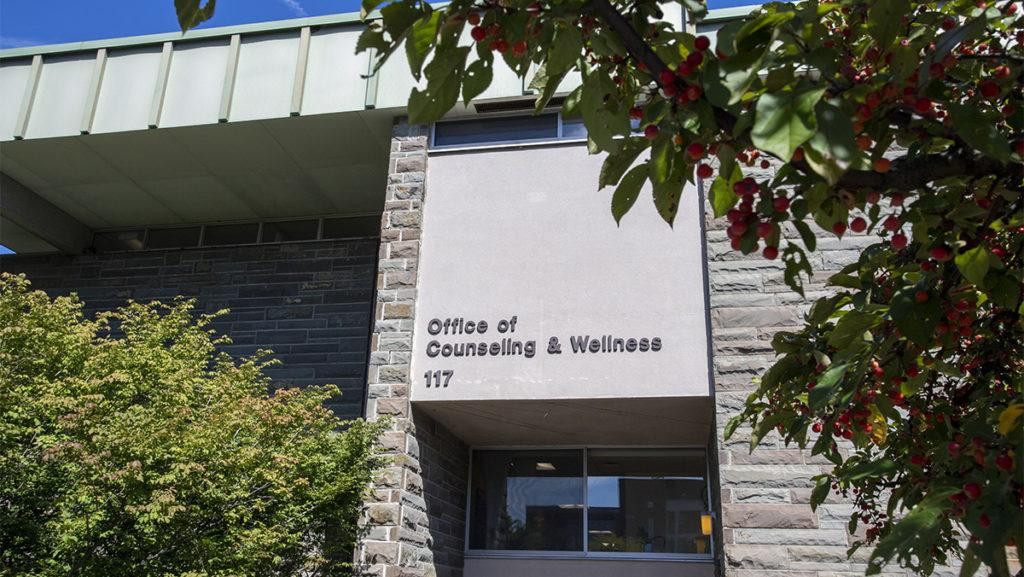The Ithaca College Center for Counseling and Psychological Services (CAPS) has returned to offering in-person appointments for the first time since Fall 2019.
In an Aug. 12 Intercom post, Brian Petersen, director of the Center for Counseling, Health and Wellness, said that the center would begin offering in-person and virtual sessions for students for the 2022–23 academic year. “Lets Talk,” an informal drop-in service that offers confidential consultations with a CAPS counselor will continue to be offered virtually over the phone or through Zoom, while individual sessions and group sessions will be offered both in person and virtually.
Petersen said that he is glad the center is able to continue providing Zoom sessions as an option for students because of the flexibility that it offers but said that many students have enjoyed returning to in-person sessions.
“So we can offer a variety of things, but I think students are voting with their feet because we’re seeing them come in and I think that says that they want that personal connection again,” Petersen said.
A 2021 study from the Association of University and College Counseling Center Directors (AUCCCD) found that only 15.5% of college counseling centers offered in-person services throughout 2020–21, while 99.3% offered teletherapy services.
Amy Whitney, a mental health counselor for CAPS, said she has been enjoying seeing students again in person because of the connection it can provide the students and how being together in a space can help people work through what they want to talk about.
“Some students find a lot of comfort in knowing there’s a particular space they can go to that over time becomes kind of a refuge,” Whitney said. “Their therapist’s office feels like a safe space and that in itself can be really nice.”
Stephanie Nevels, a mental health counselor for CAPS, said that while returning to in-person sessions has been an adjustment from only offering teletherapy, it has been a positive experience so far.
Nevels said that observing clients in-person is very different than virtually due to gauging subtle nonverbal cues, like body language that might be harder to observe online.
“While we all, I think, got really, really adept at kind of judging safety risks online, there are certain things that are more alarming or more reassuring with those sorts of nonverbal things that, as therapists, traditionally we’ve relied on,” Nevels said. “There are nonverbal cues that can sort of guide the conversation of just observing, like, ‘I’m wondering how you’re feeling right now, because I noticed this.’”
Petersen said the center usually sees between 17-20% of the student body in an academic year, with the busiest time being the beginning of classes through mid-October.
According to the AUCCCD, the average percentage of the campus community served by counseling services decreased from 13% in 2019–20 to 10.7% in 2020–21. However, the expectation is that the percentage will increase in 2021–22 due to colleges returning to more routine operations.
Petersen said that while students often think that there is a waitlist at the center, the center has not had a waitlist since 2019. He said that there can occasionally be a few–day waiting period for an intake appointment but that there is never a waiting period for a crisis or emergency counseling.
“I want every student at IC to know that if you’re having your absolutely worst day ever, you can literally walk into the counseling center on the same day and be seen by somebody, so there’s no waitlist at all for a crisis or emergency [session],” Petersen said. “And I think sometimes those two things get a little mixed up, and I would hate for a student who’s really in need to think that there’s no point calling the counseling center because they won’t be able to see me until next week or whatever. And that’s not true.”
Senior Victoria Keenan, public relations manager for the Musicians for Mental Health (MMH) Club, said MMH encourages its members to utilize resources on campus, like CAPS. Keenan said especially for music majors, the flexibility of different options for CAPS sessions is appreciated.
“You can just talk to [your therapist] on Zoom; it’s a little more convenient,” Keenan said. “But having the option to be able to go see your therapist in person, a lot of people that I’ve talked to have said that they’re really grateful for that because for some people that works a lot better for their schedules, and also just for the type of help that they need in person can sometimes be better.”
Petersen said that while the center dealt with staffing issues in Fall 2021 and Spring 2022, they have since hired three more counselors and are looking to hire one more this semester.
“We’ve been able to hire more diverse counselors, so we’re increasing the diversity of our counseling staff, which is great,” Petersen said. “So we’ll continue to try to meet the needs of students.”










